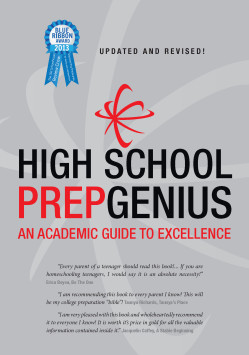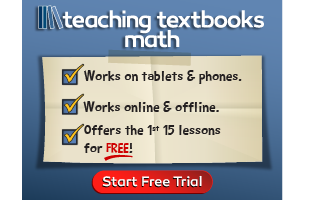High School Prep Genius is really a college prep planning guide that encourages students to think and plan ahead as early as middle school. Author Jean Burk spent many years teaching test preparation for college, and through that process as well as working with her own children, learned that starting early with test prep, academic planning, research, and skill development often pays big dividends. Judah Burk, Jean Burk’s co-author and daughter, shares much from her very recent practical experience in preparing for college.
The book is written for all students whether in a traditional or homeschool settings. It aims to substitute for or enhance the information students might receive from high school guidance counselors, college admissions counselors, or others who might assist students on this journey. Because of that, it includes information for a variety of situations. The reader needs to discern which sections are pertinent to his or her situation. Ideally, parents should read the book along with students and discuss each section. Each chapter concludes with a “Parents’ Homework section where parents are given an assignment that might involve discussion, research, planning, organizing, or some other “companion” work that supports the student at that stage of the process. This is not a book for parents to simply hand to their student to read on their own with no parental input.
The goal is college. Given recent discussions in the media about the comparative value of college, I think this book (published in 2015) probably should have spent more time on the economics of college. The high costs that often result in student loans too often leave students with expensive degrees and few available jobs that pay enough for students to repay loans. Homeschoolers have long been questioning the value of the traditional college education, and have opted for less expensive ways to either get college degrees or pursue other vocational paths. Those outside the homeschool world are coming to the same realization and are beginning to open up to alternative paths they wouldn’t have considered credible even just a few years ago. The book does state, “Typically, the more schooling you have, the higher your income, but that is not always the case” (p. 279). But elsewhere the cautionary language is generally absent. Of course, cost isn’t an issue if your children get a free ride all the way through college as did Jean Burk’s two children.
Because of this book’s approach, the audience is likely to be those families and students who are set on traditional college. Numerous discussions about test prep and strategies for gifted students narrow the ideal audience to academic high achievers. While average students will very much benefit from the guidance offered here, gifted students are likely to be most comfortable with the authors’ recommendations.
The first section of the book explains how to create and use a “college and career notebook” as part of the planning process. It lays out timelines, suggesting that bright students might even want to take the SAT in junior high to qualify for “talent search” programs. Taking SAT and other tests years in advance of the required time (senior year) helps students become familiar with the tests and proficient at taking them.
Part two of the book, “Foundation for Personal Success,” challenges students to take on personal responsibility, to develop interests beyond academics, to examine their own beliefs, to develop a healthy lifestyle, to become financial responsible, and to build a personal support system.
The third part addresses academic success through study skills, organization, and time management.
Part four turns specifically to college planning as students work on goal setting and career pathways, selection of potential colleges, college applications, scholarships, and financial aid. This section concludes with “College Essentials,” a primer for students once they’ve been accepted. It discusses preparing for that first year as well as issues such as roommates, joining fraternities or sororities, taking your own car with you, and homesickness. Some pages here are also devoted to “Common freshman misconceptions and how to avoid them.”
Since this is a planning book, it includes many charts and questionnaires to help students work through the process. It also suggests helpful websites and organizations you might want to investigate.
While some of the information seems like common sense, there is much in High School Prep Genius that is valuable and not readily known. Homeschool parents and their children are sometimes handicapped by their lack of familiarity with things that guidance counselors know, especially in regard to test-taking scheduling and strategic use of those tests. Parents with students in traditional schools should find the information valuable so they are not dependent upon a guidance counselor who might not be able to closely track the needs of each student.








